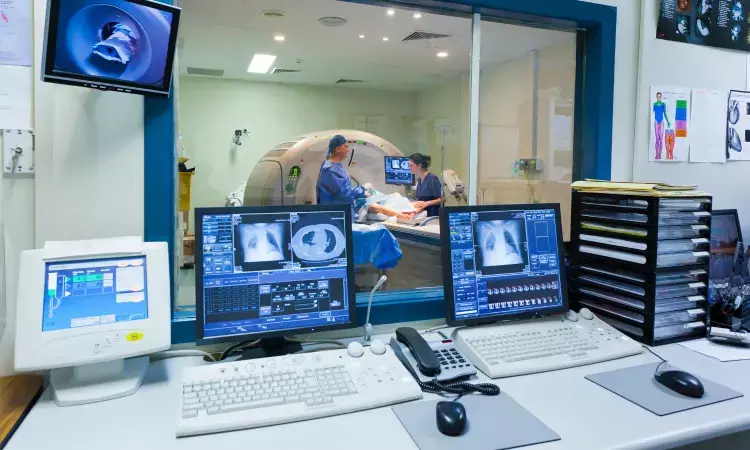- Home
- Medical news & Guidelines
- Anesthesiology
- Cardiology and CTVS
- Critical Care
- Dentistry
- Dermatology
- Diabetes and Endocrinology
- ENT
- Gastroenterology
- Medicine
- Nephrology
- Neurology
- Obstretics-Gynaecology
- Oncology
- Ophthalmology
- Orthopaedics
- Pediatrics-Neonatology
- Psychiatry
- Pulmonology
- Radiology
- Surgery
- Urology
- Laboratory Medicine
- Diet
- Nursing
- Paramedical
- Physiotherapy
- Health news
- Fact Check
- Bone Health Fact Check
- Brain Health Fact Check
- Cancer Related Fact Check
- Child Care Fact Check
- Dental and oral health fact check
- Diabetes and metabolic health fact check
- Diet and Nutrition Fact Check
- Eye and ENT Care Fact Check
- Fitness fact check
- Gut health fact check
- Heart health fact check
- Kidney health fact check
- Medical education fact check
- Men's health fact check
- Respiratory fact check
- Skin and hair care fact check
- Vaccine and Immunization fact check
- Women's health fact check
- AYUSH
- State News
- Andaman and Nicobar Islands
- Andhra Pradesh
- Arunachal Pradesh
- Assam
- Bihar
- Chandigarh
- Chattisgarh
- Dadra and Nagar Haveli
- Daman and Diu
- Delhi
- Goa
- Gujarat
- Haryana
- Himachal Pradesh
- Jammu & Kashmir
- Jharkhand
- Karnataka
- Kerala
- Ladakh
- Lakshadweep
- Madhya Pradesh
- Maharashtra
- Manipur
- Meghalaya
- Mizoram
- Nagaland
- Odisha
- Puducherry
- Punjab
- Rajasthan
- Sikkim
- Tamil Nadu
- Telangana
- Tripura
- Uttar Pradesh
- Uttrakhand
- West Bengal
- Medical Education
- Industry
MRI staging before prostatectomy for prostate cancer can predict risk of recurrence

An Original Research on Genitourinary Imaging published in the American Journal of Roentgenology on July 5, 2023, entitled, "Comparison of MRI-Based Staging and Pathologic Staging for Predicting Biochemical Recurrence of Prostate Cancer After Radical Prostatectomy” by Dr Katie and colleagues mentioned that MRI could determine the risk of prostate cancer recurrence before a patient undergoes surgery. This is a clinically valuable insight drawn by researchers from this study, as MRI staging can identify high biochemical recurrence risk and guide patients in early clinical decision-making.
Most clinical models predict biochemical recurrence (BCR) following radical prostatectomy (RP) and incorporate staging information from RP specimens. This creates a gap in risk assessment pre-operatively.
The primary purpose of the present study was to compare the utility of pre-surgical staging information from MRI and post-surgical staging information from RP pathology in predicting BCR in patients with PCa.
The summary pointers are:
- There were 604 patients with a median age of 60 years and a PCa history.
- These underwent prostate MRI before RP (June 2007 - December 2018).
- During clinical interpretations, a single genitourinary radiologist assessed MRI examinations for extraprostatic extension (EPE) and seminal vesicle invasion (SVI).
- Researchers assessed the Utility of extraprostatic extension or EPE and SVI on MRI and RP pathology for BCR prediction.
- The biochemical recurrence prediction models like the University of California San Francisco Cancer of the Prostate Risk Assessment or CAPRA and CAPRA-S were used; these were pre and post-surgical assessment tools.
- Univariable predictors of BCR included EPE on MRI, SVI on MRI, EPE on RP pathology, and SVI on RP pathology, with hazard ratios of 3.6, 4.4, 5.0, and 4.6, respectively.
- Three-year BCR-free survival (RFS) rates for patients without versus with EPE were 84% versus 59% for MRI, and 89% versus 58% for RP pathology, and for patients without versus with SVI were 82% versus 50% for MRI and 83% versus 54% for RP histology.
- For patients with T3 disease on RP pathology, 3-year RFS rates were 67% and 41% for patients without and with T3 disease on MRI. AUCs of CAPRA models, including CAPRA-MRI models, ranged from 0.743 to 0.778. AUCs were not significantly different between CAPRA-S and CAPRA-MRI models (P>.05). RFS rates were significantly different between low and intermediate-risk groups for only CAPRA-MRI models (80% vs 51% and 74% vs 44%: both P<.001).
They said Pre-surgical MRI-based staging features perform comparably to post-surgical pathologic staging features for predicting BCR.
MRI staging identifies patients at high BCR risk pre-operatively, they highlighted. This plays a crucial role in early clinical decision-making.
Further reading:
BDS, MDS in Periodontics and Implantology
Dr. Aditi Yadav is a BDS, MDS in Periodontics and Implantology. She has a clinical experience of 5 years as a laser dental surgeon. She also has a Diploma in clinical research and pharmacovigilance and is a Certified data scientist. She is currently working as a content developer in e-health services. Dr. Yadav has a keen interest in Medical Journalism and is actively involved in Medical Research writing.
Dr Kamal Kant Kohli-MBBS, DTCD- a chest specialist with more than 30 years of practice and a flair for writing clinical articles, Dr Kamal Kant Kohli joined Medical Dialogues as a Chief Editor of Medical News. Besides writing articles, as an editor, he proofreads and verifies all the medical content published on Medical Dialogues including those coming from journals, studies,medical conferences,guidelines etc. Email: drkohli@medicaldialogues.in. Contact no. 011-43720751


